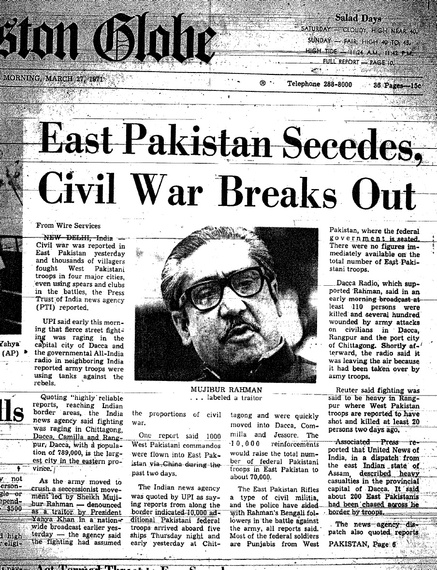Exactly 44 years ago, on 16th December 1971, Pakistani army was defeated and Bangladesh officially became an independent country. This day is celebrated in Bangladesh as "Victory Day".
One of my friends at Cornell who is from Bangladesh once told me in detail about the way his nation thought about years from 1947 to 1971 ( when Bangladesh was East Pakistan) and about what happened during the war. He then told me that the scars of the brutal repression by West Pakistan back in 1971 have not completely healed. That was the time when Shahbag protests were taking place demanding capital punishments for those who had been convicted of war crimes.
He then posed a question to me: " Why doesn't Pakistan apologize? A mere word of apology would make a lot of difference and allow us to move forward." He countered the criticism that trials were nothing but a political gimmick by Haseena Shaikh's government to extract mileage. " Even if the government is benefiting, the fact is this is what Bangladeshis want".
I already have written on the need for apologizing to Bangladesh in my article titled as "The Need for Collective Apology to Bangladesh" and I personally think that as Bangladesh grapples with the execution of war criminals and its aftermaths, the need for apology becomes even more significant.
Recently our cricketer turned politicians Imran Khan wrote a letter to Bangladesh government asking it to stop hanging of two Bangladeshi politicians convicted of war crimes in 1971. Likewise, Pakistani lawmakers also submitted a resolution condemning these hangings. I find it strange that instead of actually accepting our guilt we are getting worried if Bangladesh which is a sovereign country even tries to punish its own.
Frankly from a moral point of view, Pakistan should have itself put its own officers to trial for committing war crimes against its own citizens. Let us not forget at that time, those civilians who were killed were Pakistani citizens. Even if they had not been Pakistanis, a crime is a crime.
However, I understand that perhaps this expectation is too far-fetched as even USA has not always put its soldiers for war crimes.
But an apology is something which is the least Pakistan could do and yet even that has so far proven to be unforthcoming. In fact even the moral acknowledgement by the population is lacking as an overwhelming majority is still in denial with respect to the extent of Pakistani atrocities. In fact for many it was merely a military failure due to collaboration between Mukti Bahini and Indian army. And moreover according to them, it was just Mukti Bahini which committed atrocities against Pakistani citizens in Bangladesh.
Even today our discussions about 1971 revolve around number of killed by Mukti Bahini and in our collective psyche, the massacre conducted by our own either simply does not exist or is clearly less atrocious compared to killings by Mukhi Bahini.
When I say Pakistan should apologize, the apology is not merely for killing its own people but also what preceded that. What happened in 1971 is merely the culmination of a nightmare which frankly started immediately after independence.
The fact is that the idea that there should be East Pakistan was even a big anomaly as one thousand miles separated the two and Bengalis were extremely different than those residing in West Pakistan. Even if Two Nation Theory had to be applied, it should have resulted in a different country right from the beginning.
And once it materialized, the only way forward was a very loose confederation as there was absolutely no point going for a structure with a strong center. Ethnic identity is a reality which needs to be integrated by allowing sufficient degree of political, economic and cultural autonomy. Only when an ethnicity has this kind of autonomy , it will align itself with the state. You cannot make the ethnic identity disappear by whipping religion or imposing a different language as national language on the pretext that national language is not spoken by other ethnicities also and hence is "neutral". Nor you can address possible fracture in the state on ethnic lines by administrative measures such as One Unit.
Secession takes place when ethnic identity transforms into ethnic nationalism aimed at complete separation from the state. And this transformation happens when the perception develops that the state is biased on ethnic lines.
My dear Pakistani brother and sisters, who just see the entire episode through Indian conspiracy paradigm, kindly open your eyes. If those people who were far more vigilant in supporting creation of Pakistan , end up seeking Indian help for independence, then it merely shows the humiliation which they must have felt.
Yes Pakistan needs to apologize. The apology for which I am making a case is perhaps even less for the final drop scene but more for what we did before that. In a united Pakistan, Bengalis were grossly underrepresented in employment. Revenue generated by them was being spent in West Pakistan and above all there was adoption of that derogatory tone and condescending attitude towards them which was often expressed in derogatory terms like "Bingos".
And we did all that to who had wholeheartedly supported creation of Pakistan.
Yes sorry wont compensate whatever has been done and there is a possibility that many Bengalis won't even accept it for not being enough. But then to say sorry is our duty and to forgive is their choice. And when it is a matter of duty, it has to be done irrespective of whether the counter party exercises its choice or not.We are sorry Bangladesh

